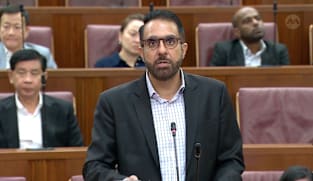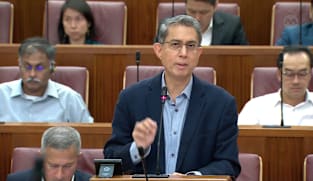Muhammad Faishal Ibrahim on next-generation immigration clearance following disruption on Mar 31
The Immigration and Checkpoints Authority (ICA) was conducting a pre-scheduled trial needed to upgrade its Multi-Modal Biometrics System (MMBS) on Mar 31 but this caused a severe system overload. Automated clearance lanes at all the departure halls in Changi Airport and certain automated lanes at Woodlands and Tuas checkpoints were impacted. The trial was conducted during the off-peak hours and was scheduled to take place from 10am to 2pm. The plan was to recover the system within 30 minutes if the trial did not go well. The trial caused the storage systems to overload at about 10.40am and the process was aborted immediately. However, the extent of the overload was much more severe than anticipated. The vendors who were on site had to work with their global support team to diagnose and reboot the servers. In the end, the recovery process took about 4½ hours and the MMBS recovered around 3pm. Minister of State for Home Affairs Muhammad Faishal Ibrahim gave this update in reply to MPs’ questions in Parliament on Friday (Mar 21). He said ICA immediately activated its business continuity plan. At the land checkpoints, travellers experienced delays but about 55,000 travellers passed through during the disruption. Immigration clearance at the airport’s departure halls was significantly impacted. During the disruption, about 30,000 passengers on 113 departure flights and 111 arrival flights cleared immigration. Of these, 21 people missed their flights at Terminal 4. Dr Faishal said ICA is reviewing the approach to the upgrade. It is also in the process of implementing a multi-year plan known as the New Clearance Concept (NCC) to transform and provide more seamless clearance. Under NCC, all manual clearance counters and automated lanes will be replaced in phases with next-generation Automated Border Clearance System (ABCS) gates which will allow travellers to continue using automated clearance even when the MMBS is down. In the meantime, the resiliency of existing automated lanes that have yet to be replaced by the ABCS gates will also be enhanced in the second half of this year. Dr Faishal said Singapore is one of the first countries in the world to implement NCC-type capabilities. It will work closely with all stakeholders to further minimise technical disruptions and enhance system resiliency. “The reality is disruptions will still happen now and then. When they do, we will make sure we have robust contingency plans in place and try to recover as fast as possible,” he said.
The Immigration and Checkpoints Authority (ICA) was conducting a pre-scheduled trial needed to upgrade its Multi-Modal Biometrics System (MMBS) on Mar 31 but this caused a severe system overload. Automated clearance lanes at all the departure halls in Changi Airport and certain automated lanes at Woodlands and Tuas checkpoints were impacted. The trial was conducted during the off-peak hours and was scheduled to take place from 10am to 2pm. The plan was to recover the system within 30 minutes if the trial did not go well. The trial caused the storage systems to overload at about 10.40am and the process was aborted immediately. However, the extent of the overload was much more severe than anticipated. The vendors who were on site had to work with their global support team to diagnose and reboot the servers. In the end, the recovery process took about 4½ hours and the MMBS recovered around 3pm. Minister of State for Home Affairs Muhammad Faishal Ibrahim gave this update in reply to MPs’ questions in Parliament on Friday (Mar 21). He said ICA immediately activated its business continuity plan. At the land checkpoints, travellers experienced delays but about 55,000 travellers passed through during the disruption. Immigration clearance at the airport’s departure halls was significantly impacted. During the disruption, about 30,000 passengers on 113 departure flights and 111 arrival flights cleared immigration. Of these, 21 people missed their flights at Terminal 4. Dr Faishal said ICA is reviewing the approach to the upgrade. It is also in the process of implementing a multi-year plan known as the New Clearance Concept (NCC) to transform and provide more seamless clearance. Under NCC, all manual clearance counters and automated lanes will be replaced in phases with next-generation Automated Border Clearance System (ABCS) gates which will allow travellers to continue using automated clearance even when the MMBS is down. In the meantime, the resiliency of existing automated lanes that have yet to be replaced by the ABCS gates will also be enhanced in the second half of this year. Dr Faishal said Singapore is one of the first countries in the world to implement NCC-type capabilities. It will work closely with all stakeholders to further minimise technical disruptions and enhance system resiliency. “The reality is disruptions will still happen now and then. When they do, we will make sure we have robust contingency plans in place and try to recover as fast as possible,” he said.



















